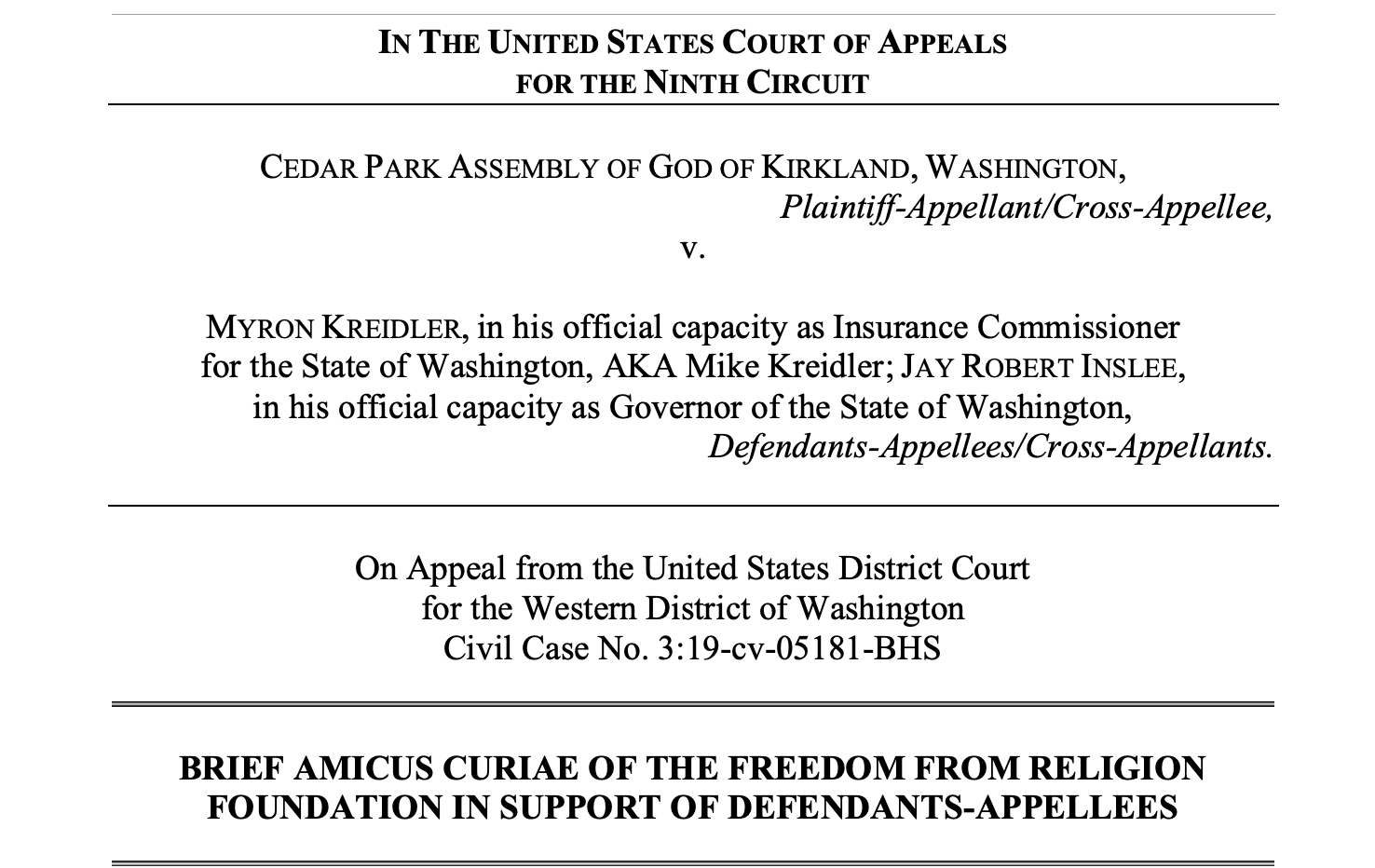A church’s court challenge of a 2018 Washington law giving citizens access to abortion and contraceptive coverage lacks legal standing, asserts a just-filed Freedom From Religion Foundation amicus brief.
The Cedar Park Assembly of God, the plaintiff, contends that a state law requiring all health insurance companies to provide citizens access to abortion care coverage and contraceptives, even when their employer’s health insurance doesn’t cover those services for religious reasons, violates its First Amendment rights. Cedar Park, based in Bothell, claimed that the law, SB 6219, requires exempt religious organizations to “facilitate” access to abortion and contraceptives in violation of their religious beliefs. The state of Washington says that Cedar Park’s Free Exercise rights are not violated since Cedar Park falls under an exception to the law for religious organizations and is not required to purchase abortion or contraceptive coverage.
A district court ruled in favor of the state, holding that the law does not violate Cedar Park’s Free Exercise rights or its rights under the church autonomy doctrine. Cedar Park has appealed to the 9th U.S. Circuit Court of Appeals.
Cedar Park doesn’t have standing because it hasn’t shown that it has actually been injured or will be injured by the state law, maintains the FFRF friend-of-the-court brief. It is plain that the injuries Cedar Park initially alleged are, at best, attenuated hypotheticals lacking a concrete factual basis in reality; therefore, this case must be dismissed. At the summary judgment stage, it is the plaintiff’s duty to produce sufficient admissible evidence in the record to show that it has suffered a concrete injury that is actual or imminent. Cedar Park has not met this burden, FFRF convincingly asserts.
“On this second appeal, Cedar Park has whittled its claimed injury down to an allegation that SB 6219 violates Cedar Park’s free exercise and church autonomy rights because it (a) allows employees to access abortion care and contraceptives even when their employer-provided health insurance does not directly cover those services; and (b) may theoretically allow health carriers to charge employers a nominal fee increase for covering the costs of services not included in the employer’s plan,” states the brief.
The primary injury that Cedar Park claims is the possibility that one or more of its employees will access health care services of which Cedar Park disapproves. Cedar Park protests in its filings that its employee health insurance card might briefly be used in the process of an employee theoretically accessing that care. However, it has not set forth evidence that any of its employees (or their spouses or dependants) have accessed abortion care or contraceptive services; it has not set forth evidence that any of its employees intend to access these services; and it has not set forth evidence that any of its employees have attempted to access these services since SB 6219 went into effect nearly five years ago.
And Cedar Park has made it extremely unlikely that any of its employees will ever attempt to access such services. Each Cedar Park employee “signs a statement agreeing to ‘conduct their professional and personal lives in a manner’” that is consistent with Cedar Park’s religious beliefs and they “agree ‘to refrain from behavior that conflicts or appears inconsistent with evangelical Christian standards as determined in the sole and absolute discretion of Cedar Park.’”
Cedar Park’s second basis for its alleged injury is its assertion that health carriers may perhaps “pass along the cost” of covering abortion care and contraceptives to Cedar Park in the form of “increased premiums, administrative, or overhead expenses” or other costs. To support this assertion, Cedar Park cites only a 2002 Washington attorney general opinion that offered a nonbinding interpretation of the conscience clause.
“But Cedar Park’s worry that its health carrier might pass along the costs of covering these services is a hypothetical that relies on a highly attenuated chain of events, insufficient to confer an injury,” states FFRF’s brief. Without supporting evidence, Cedar Park’s conclusion that health carriers will pass along the cost of uncovered health services is unpersuasive and insufficient to establish an injury in fact.
Finally, Cedar Park cannot establish standing by showing that Washington will enforce SB 6219 against it because the law regulates health insurance companies, not employers. Cedar Park is free to negotiate for and purchase health insurance that doesn’t cover services that it objects to on religious grounds.
Since Cedar Park lacks standing, the 9th U.S. Circuit Court of Appeals should dismiss the appeal for lack of jurisdiction, FFRF’s brief concludes. Alternatively, the appeals court should affirm the district court’s ruling.
You can read the FFRF amicus brief here.
FFRF Anne Nicol Gaylor Legal Fellow Sammi Lawrence was the lead attorney in preparing the brief. FFRF Associate Counsel Sam Grover is the counsel of record for the brief.
The Freedom From Religion Foundation is the largest national association of freethinkers, representing atheists, agnostics, and others who form their opinions about religion based on reason, rather than faith, tradition, or authority. FFRF has over 40,000 members and several chapters nationally, including over 1,700 members and a chapter in the state of Washington.
FFRF and its members have an interest in ensuring that religious employers are not privileged over secular employers and given carte blanche to avoid complying with health insurance regulations. FFRF’s interest in this case arises from the fact that most of its members are atheists or nonbelievers, as are the members of the public it serves as a state/church watchdog. Additionally, almost all of FFRF’s members consider access to reproductive health care a vital secular policy issue, and a recent membership survey showed that 98.8 percent of FFRF members support access to abortion care.
If you are an FFRF member, sign into your account here and then update your email subscriptions here.
To become an FFRF member, click here. To learn more about FFRF, request information here.


